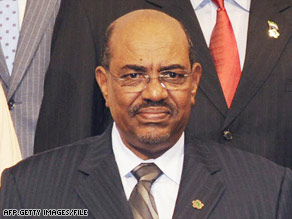THE HAGUE, Netherlands (CNN) — The International Criminal Court at the Hague issued an arrest warrant Wednesday for Sudanese President Omar Hassan al-Bashir for a five-year campaign of violence in Darfur.

Al-Bashir is the first sitting head of state to be charged by the permanent war crimes court.
Five counts are for crimes against humanity and include murder, extermination, forcible transfer, torture, and rape, Blairon said. The other two are for war crimes, for intentionally directing attacks against civilians and for pillaging.
The indictment against al-Bashir marks the first time prosecutors at the world’s only permanent war crimes tribunal have issued charges against a sitting head of state.
The violence in Darfur erupted in 2003 after rebels began an uprising against the Sudanese government. To counter the rebels, Sudanese authorities armed and cooperated with Arab militias that went from village to village in Darfur, killing, torturing and raping residents there, according to the United Nations, Western governments and human rights organizations. The militias targeted civilian members of tribes from which the rebels drew strength.
Last year the ICC’s chief prosecutor, Luis Moreno-Ocampo, told CNN’s Nic Robertson that he had “strong evidence that al-Bashir is committing a genocide.” He added: “I cannot be blackmailed, I cannot yield. Silence never helped the victims. Silence helped the perpetrators. The prosecutor should not be silent.”
Al-Bashir bears responsibility, Moreno-Ocampo said, because he sat at the apex of the government.
“For such crimes to be committed over a period of five years and throughout Darfur, al-Bashir had to mobilize and keep mobilized the whole state apparatus; he had to control and direct perpetrators; and he had to rely on a genocidal plan,” Moreno-Ocampo wrote as background for arrest warrant request.
Sudanese Vice President Ali Osman Mohammed Taha has long rejected the authority of the ICC, saying Sudan was not a signatory to the court’s creation.
“Hence there is no legal obligation or power over Sudan, whether Sudanese organizations or citizens,” he said.
Taha also called the charges an attempt to “paralyze” his country. And Abdalmahmood Abdalhaleem Mohamad, Sudan’s ambassador to the United Nations, said his government would respond through legal, political and “other means.”
“The limit is the sky for our retaliation,” he said.
About 300,000 people have died in Darfur, the United Nations estimates, and 2.5 million have been forced from their homes.
Last month, renewed fighting forced thousands of people in the southern part of Darfur to seek security and shelter at a refugee camp in the north of the war-torn area, the United Nations said.
The U.N.’s Office for the Coordination of Humanitarian Affairs (OCHA) reported that fighting in Muhajeria and Shearia between Sudanese government forces, and the rebel Justice and Equality Movement (JEM), drove over 15,000 people north to the Zam Zam camp.
The water supply to the camp is becoming strained with displaced people arriving there every day, OCHA added.
The Fighting continued in the region despite the JEM and local government signing a “goodwill and confidence-building” agreement earlier this year, according to the U.N.
The U.N.-African Union allied peacekeeping mission (UNAMID) will begin building a new community police center near Zam Zam in the next two weeks.
CNN’s Nic Robertson contributed to this report.
http://www.cnn.com/2009/WORLD/africa/03/04/…charges/
 Uniting Missions in Africa
Uniting Missions in Africa
No user commented in " International Court issues arrest warrant for Sudanese president (cnn.com) "
Follow-up comment rss or Leave a